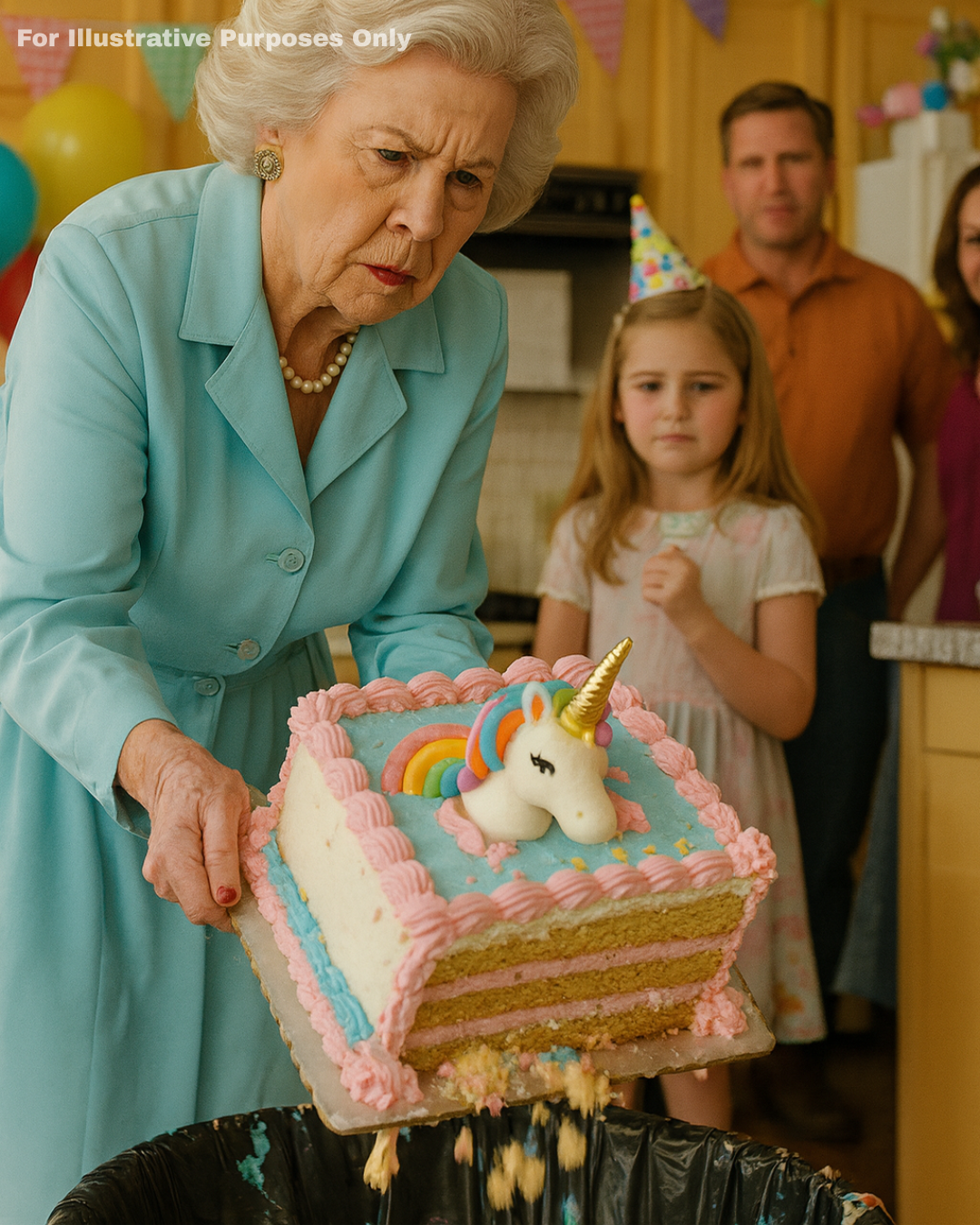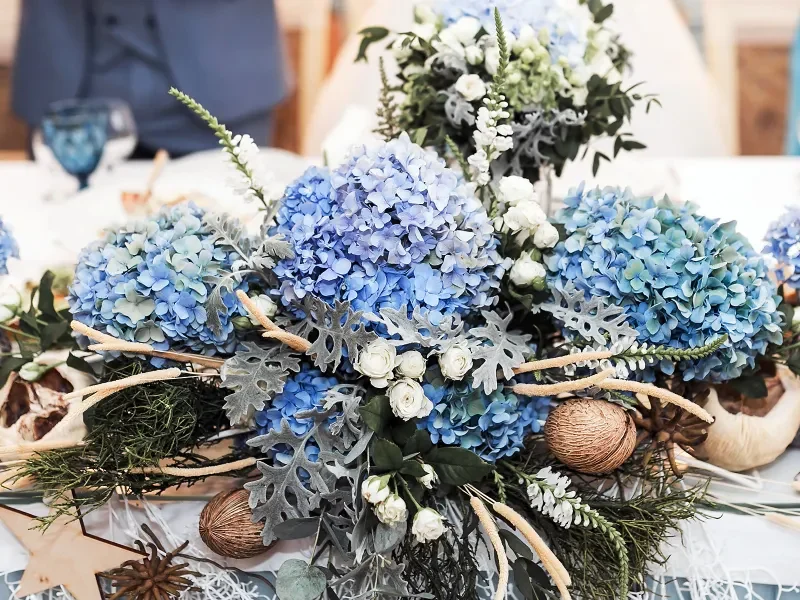At my daughter’s birthday, my mother-in-law shoved the cake aside and said, “She doesn’t deserve this.” My husband just stood there, silent. My daughter looked like she was about to cry—but instead, she smiled, pulled out her tablet, and said, “Grandma, I made you a video.” What followed left the entire room frozen in silence.
My mother-in-law, Dolores, stood near the trash can, holding Rosalie’s unicorn birthday cake as though it was spoiled food. Three tall layers of soft vanilla sponge, hours of work covered in buttercream roses and topped with a rainbow-colored fondant unicorn, were dangling on the edge of being tossed away with coffee grounds and greasy leftovers.
“She doesn’t deserve a celebration,” Dolores declared sharply, her voice cutting straight through the birthday song we had just been singing.
Craig, my husband, remained in his chair. He didn’t move, didn’t speak—his hands were still raised mid-clap. Rosalie, our daughter, only seven years old, stared as her grandmother ruined what was supposed to be the highlight of her special day. Other parents gasped. The children stopped talking. The air was heavy with shock.
But what Rosalie did next was something none of us could have predicted.
I’m Bethany, 34 years old, a teacher in an elementary school. I’ve always believed I understood children well—I work with them every day. But that afternoon, my own little girl showed me what true courage looks like. Rosalie has always been unusual. She gives her stuffed animals names like Justice Ginsburg or Justice Sotomayor. She insists on reading the headlines with me while pretending she’s only coloring. She misses nothing.
My husband Craig is a kind man. He’s brilliant with software, but when it comes to confrontation, he shrinks. He’s the kind of person who apologizes when someone else bumps into him. That gentle heart is what I fell in love with years ago, but it’s also what has left us vulnerable. Because there has always been one person he never challenged: his mother, Dolores.
Dolores, at sixty-two, is a retired bank manager who has made a second career out of crushing joy. In her eyes, children are to be seen but not heard, and they certainly don’t deserve to be celebrated unless they achieve perfection. Birthdays, in her world, are indulgences.
I should have seen it coming. That morning, Rosalie had run into my room, her purple dress with tiny silver stars sparkling in the light. “Mommy, do you think Grandma will like my surprise?” she asked, clutching her tablet. For weeks she had been working on something she called her special project.
“I’m sure she’ll love it,” I told her. But in truth, I doubted it. Dolores had not approved of a single thing I’d done since Craig and I married.
Our little house had been transformed. Rosalie and I had cut out dozens of paper butterflies, stringing them from the ceiling. Biscuit, our aging golden retriever, had a party bandana tied around his neck. I had stayed up until nearly two in the morning, finishing the unicorn cake.
Craig had stayed in the garage. Avoiding his mother had become his way of coping. “She’s just old-fashioned,” he said whenever I complained. “She means well.” But meaning well doesn’t excuse cruelty.
The first sign of trouble was when Dolores walked in and surveyed the decorations. “All this fuss for a seven-year-old?” she scoffed. “Children used to be happy with a simple cake and a family dinner.”
Craig muttered, “Mom, please,” but she ignored him.
I noticed Rosalie’s small shoulders droop. She had even decorated a special party hat for her grandmother, glittery letters spelling out World’s Best Grandma. Dolores didn’t even look at it.
The party started anyway. Parents mingled, kids laughed. But Dolores never stopped criticizing. She scolded Rosalie for slouching. She declared sugar “poison.” She told another parent that kids these days were spoiled by “too many gadgets.” Every sentence she spoke was like a pin, slowly popping the joy out of the room.
By the time the cake came out, I was exhausted. But Rosalie’s face lit up at the sight of it. Seven candles glowed, her friends gathered around, and we all began to sing. She closed her eyes, ready to make her birthday wish.
Then Dolores rose to her feet. “Stop this nonsense,” she snapped. “This child doesn’t deserve to be rewarded. She got a C on her spelling test last week. And here she is, being spoiled with a party? This is what’s wrong with your generation, Bethany—no discipline, no standards.”
“Mom, that’s enough,” Craig tried, but his voice was soft, trembling.
Dolores ignored him. She marched to the table, grabbed the cake, and carried it into the kitchen. “She doesn’t deserve a celebration,” she declared once more. And then, before anyone could react, she dropped the unicorn cake into the trash.
The thud of it landing against coffee grounds and leftovers was louder than it should have been. The horn snapped off. Frosting smeared against garbage. The silence was unbearable.
I looked at Rosalie, expecting to see her break down. Tears filled her eyes. But then something happened. She wiped them away. Slowly, she smiled—not the happy smile of a child, but a deliberate, knowing grin.
“Grandma,” Rosalie said, her voice steady, “I understand you’re disappointed. But I made something for you. Do you want to see it?”
Dolores blinked, surprised. “What is it?”
“A video,” Rosalie answered. She ran to fetch her tablet. “I made it for school, but it’s really for you.”
Dolores smirked. “Well, let’s see it then.” She settled onto the couch, confident, smug.
Rosalie connected her tablet to the TV and pressed play. The screen lit up with cheerful music and a title: The Important Women in My Life, by Rosalie Mitchell.
“The most important woman in my life is my Grandma Dolores,” came Rosalie’s voice, recorded. Dolores lifted her chin proudly.
But then the first clip played. It was Thanksgiving. Dolores’s voice filled the room: “That child is manipulative, just like her mother. She cries for attention—it’s pathetic.” The camera caught her reflection in a cabinet. In the background, Rosalie, supposedly napping, was crying silently on the couch.
Dolores’s smile froze.
The next clip appeared. A FaceTime call from Christmas. Dolores: “Craig married beneath him. Bethany can’t even cook. And their daughter? Spoiled rotten. I can’t even tell my friends without being embarrassed.”
Gasps filled the room.
Clip after clip played. Dolores at Rosalie’s school play: “She has no talent. Just like her mother.” Dolores at the hairdresser: “The child is chunky. She’ll probably always be average at best.” Dolores to her sister: “I’m trying to get Craig to file for divorce. If he does it while Rosalie’s young, she won’t even remember Bethany.”
Every word was clear, undeniable.
The video ended with Rosalie herself, sitting at her desk. “My Grandma Dolores taught me that words can hurt more than falling off my bike. She taught me that bullies can look like anyone—even grandmothers. But she also taught me that telling the truth matters. That’s why I recorded everything.”
The credits rolled: Dedicated to all kids who feel unloved by people who pretend to care. You are not alone.
The room was silent. Dolores’s face drained of color. She grabbed her purse. “This is outrageous! Craig, your daughter—!”
“My daughter,” Craig interrupted, his voice firmer than I had ever heard, “just showed us the truth. You’ve been tearing Bethany down for years. You’ve been cruel to Rosalie. And I let it happen. That ends today.”
“You’re choosing them over me?” Dolores shouted.
“There is no choosing,” Craig said coldly. “There’s right and wrong. And you’re wrong.”
Dolores stormed out, slamming the door. Three paper butterflies shook loose from the ceiling.
No one spoke for a long moment. Then one child began clapping. Soon, the room filled with applause. Rosalie bowed.
That night, we replaced the cake with a store-bought chocolate one. We sang again. And this time, Craig sang the loudest, holding Rosalie close.Later, in her journal, Rosalie wrote: Today I turned seven. Grandma threw my cake away, but I got something better. Daddy finally stood up for us. Best birthday ever.
It has been six months since that day. Dolores has only contacted us through one lawyer’s letter, which our attorney dismissed with a laugh. Craig now goes to therapy. He’s learning to use his voice, to defend instead of just avoid. Last week, he told his boss he wouldn’t work weekends anymore because “my daughter is growing up too fast, and I won’t miss it.”
Rosalie started a Kindness Club at school. She helps other kids who feel hurt or bullied. One evening she asked me, “Mommy, was I mean to Grandma?”
“No, sweetheart,” I told her. “You were brave. You showed the truth.”
She smiled. “Maybe one day Grandma will say sorry. Maybe then we can try again.”
That’s my daughter. Even after everything, she still hopes. She still keeps her heart open. And she reminded me that sometimes the smallest voices speak the loudest truths.


